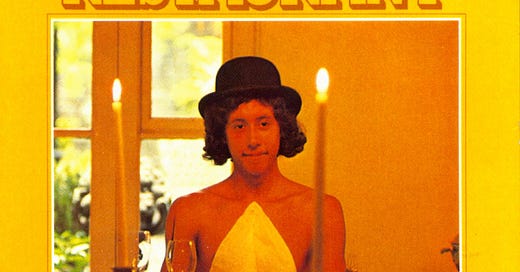A Complicated Tradition for a Complicated Holiday: Alice’s Restaurant on Thanksgiving
How I’m passing on the counter-culture, anti-authoritarianism that my parents taught me
(The cover of the single of Alice’s Restaurant, where Arlo Guthrie is sitting at a Thanksgiving table, shirtless, with a napkin somehow hanging off of his chest)
My husband gave me a “well, are you going to do it?” look. “What?” I responded, Facebook preoccupying my time as we drove to my parents’ house on Thanksgiving.
“Alice’s,” he said, giving me another look.
“Oh! Thank you for reminding me,” I said, pressing play on the song Alice’s Restaurant on my phone. “It’s not very child-appropriate. Oh well.”
So the opening notes of Arlo Guthrie’s epic 20-minute war protest drifted through the car. And we continued a long-standing family Thanksgiving tradition.
Every year, my family would listen to Alice’s Restaurant on the three hour trip from just north of Albany, New York to my relatives’ house in New Jersey. We’d try to catch it on Q104.3, New York City’s classic rock station, at noon as we passed by the city skyline. But if that didn’t happen, we’d slip my dad’s well-worn Arlo Guthrie’s Best Of tape into tape player. Despite the rambling song, I knew almost the whole thing by heart by the time I was an adult.
For those not familiar with it, the song details - with a lot of hyperbole - the entire story of Arlo Guthrie’s experience signing up for the Vietnam War draft. It starts one Thanksgiving when he tried to help a friend by disposing of her pile of garbage. Failing to find a dump - because it was closed on Thanksgiving - he and his friend threw it to the bottom of a cliff. When the police in the tiny town of Stockbridge, MA found it, they put him in jail and have an over-the-top trial. He thinks nothing else of it until he goes to New York City to sign up for the Vietnam War draft. There, he’s told that he may not be eligible for the military because he improperly disposed of garbage years before. That culminates in the classic line, “I'm sittin' here on the Group W bench, cause you want to know if I'm moral enough to join the Army, burn women, kids, houses and villages after bein’ a litterbug?!”
So why do we continue to play this ridiculous song on Thanksgiving? In part because it’s a family tradition. But there are plenty of family traditions that get dropped. (Especially because the song does have some problematic lines.)
We continue to play it because this song taught me so much about useful reasons to question authority. It introduced me to the fact that the justice system can and does punish people disproportionate to their crimes. It highlights how we judge the morality of actions on who is doing it and under what authority more than the actual action. It reveals the absurdity of bureaucracy and who we say is “okay” to participate in our government and who isn’t. This set the stage for so many of my present day concerns, from police brutality to immigration. When my mom commented this morning “Huh, what a Thanksgiving Day song,” I pointed out that an anti-war protest song was actually a perfect choice for what is a fraught holiday in terms of justice.
I also learned a lot about protest itself. The song is downright hilarious. Sure, it’s self-indulgent and goes on for way too long, but it’s funny. There’s a time and place for serious protest, but parody, satire, and theater can change the world.
These are all lessons I want to pass on to my kids. I want them to question the fairness of power structures. I want them to think critically about how things are set up and who gets hurt as a result of those systems. Alice’s Restaurant isn’t the start or the end of those conversations, but it’s certainly a part of them.
As aggravating it is when my kids question my authority at bedtime, these attitudes will make them better people in the end. And even on the Thanksgivings when I forget to play Alice’s Restaurant, I hope they hold those lessons in their hearts anyway.
For those in the U.S., it’s important to have a good understanding of the real history - not the idealized one - of Thanksgiving. Thanksgiving isn’t the simple cute story most of us were taught in school. It’s a complex story of Indigenous folks getting killed by sickness brought over by colonists, colonists stealing from Indigenous folks, kidnapping, and skepticism of peace on both sides. Here’s a great article that quotes a number of Native American historians on how to talk to kids about it: https://www.today.com/parents/how-tell-thanksgiving-story-your-kids-t200911




